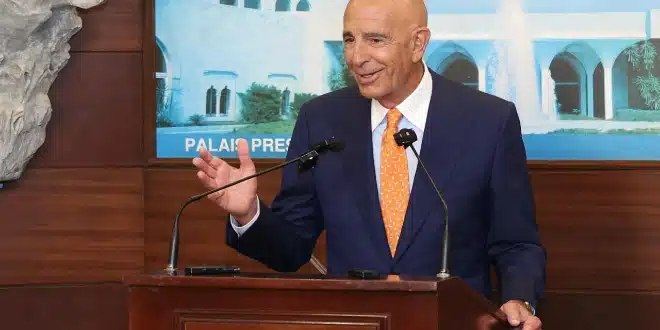Lebanon is expected to receive a formal response from the United States today regarding its latest counterproposals to American envoy Tom Barrack’s recent diplomatic paper, according to sources who spoke with Al-Jadeed TV. This exchange marks a critical moment in the ongoing effort to de-escalate tensions between Israel and Hezbollah.
U.S. Demands Concrete Action from Beirut
Tom Barrack, representing Washington’s diplomatic stance, delivered a stern message over the weekend, emphasizing that Lebanon’s global credibility hinges on its willingness to translate its political rhetoric into actionable commitments. “As its leaders have said repeatedly, it is critical that the state has a monopoly on arms,” Barrack noted, reiterating the longstanding demand that Hezbollah relinquish its weapons. He warned that without tangible steps from both the Lebanese government and Hezbollah, the country risks remaining stuck in a cycle of instability.
Barrack’s comments reflect Washington’s mounting impatience with what it views as political stagnation in Beirut. U.S. officials are now pressuring the Lebanese government to issue a formal cabinet resolution that explicitly commits to the disarmament of Hezbollah. Such a decision is being positioned as a prerequisite for restarting negotiations aimed at halting Israel’s ongoing military activity in southern Lebanon.
Ceasefire Conditions Stall Amid Political Gridlock
According to five individuals with direct knowledge of the situation, the United States has made it clear that further diplomatic engagement hinges on Lebanon’s immediate compliance with this disarmament demand. The proposed cabinet vote is seen by U.S. officials as a test of Beirut’s seriousness in asserting state authority over non-state military actors.
Hezbollah’s political patron, Lebanese Parliament Speaker Nabih Berri, has reportedly sought to shift the conversation by urging Washington to first secure an end to Israeli airstrikes. According to four separate sources, Berri proposed that implementing last year’s ceasefire agreement be the initial step toward broader de-escalation. However, Israeli authorities rejected this suggestion late last week, those same sources confirmed.
In response, U.S. officials have doubled down on their insistence that Lebanon move forward without delay. They argue that a formal cabinet vote is essential to demonstrate that the Lebanese government is prepared to reclaim its sovereignty over military decision-making.
Implications for Regional Stability
This diplomatic impasse comes amid heightened tensions along the Israel-Lebanon border, where periodic clashes between Israeli forces and Hezbollah fighters have continued despite the formal ceasefire agreement. The broader international community, particularly the United States and European Union, has long viewed Hezbollah’s independent military capabilities as a central obstacle to achieving long-term peace in Lebanon.
Washington’s latest push signals a shift toward a more assertive approach, potentially setting up a confrontation between Lebanon’s fragile coalition government and Hezbollah, which holds considerable influence in both political and military arenas.
Whether Lebanon’s cabinet will acquiesce to U.S. demands remains to be seen, but the stakes are rising. A failure to act could prolong diplomatic deadlock and risk further escalation on the ground—while compliance could trigger internal political backlash from Hezbollah and its allies.
For now, all eyes are on Beirut, where today’s anticipated U.S. response may set the tone for the next chapter in a deeply entrenched regional conflict.


